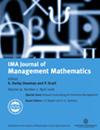循环赛追赶赛的随机规划方法
IF 4.3
3区 工程技术
Q3 MANAGEMENT
引用次数: 1
摘要
在大多数体育联盟中,时间表都是在赛季开始前公布的。然而,由于意外事件(例如恶劣的天气条件),一些比赛无法在宣布的日期进行。为了解决这个问题,在赛季开始前,空的所谓追赶轮被安排在时间表中作为缓冲。在赛季期间,比赛可以重新安排到这些追赶回合。我们开发了一种两阶段随机规划方法来确定追赶轮的位置,以保持已实现进度的质量。虽然我们的方法是普遍适用的,但我们展示了它在足球中的应用。场景及其概率是根据欧洲10个主要足球联赛的历史数据推导出来的。我们研究了追赶轮的数量和成本对追赶轮位置的影响,并将我们的方法与文献中的其他主动策略进行了比较。最后,我们对英超联赛进行了案例研究。特别是当许多游戏无法按计划进行,并且几乎没有追赶回合可用时,我们的随机规划方法在保持公平排名和避免取消游戏方面优于现有方法。本文章由计算机程序翻译,如有差异,请以英文原文为准。
A stochastic-programming approach for scheduling catch-up rounds in round-robin sport leagues
In most sport leagues, a schedule is announced before the start of the season. However, due to unexpected events (e.g. bad weather conditions), some games cannot be played on the announced date. To handle this, before the start of the season, empty so-called catch-up rounds are positioned in the schedule as a buffer. During the season, games can then be rescheduled to these catch-up rounds. We develop a two-stage stochastic programming approach to determine where to position the catch-up rounds in order to maintain the quality of the realized schedule. While our method is generally applicable, we demonstrate its use with soccer. Scenarios and their probabilities are deduced from historical data from 10 major European soccer leagues. We study the impact of the number of catch-up rounds and costs on the positions of catch-up rounds and compare our method with other proactive strategies from the literature. We conclude with a case study based on the English Premier League. In particular when many games cannot be played as planned and few catch-up rounds are available, our stochastic programming approach outperforms existing methods with respect to maintaining a fair ranking and avoiding cancelled games.
求助全文
通过发布文献求助,成功后即可免费获取论文全文。
去求助
来源期刊

IMA Journal of Management Mathematics
OPERATIONS RESEARCH & MANAGEMENT SCIENCE-MATHEMATICS, INTERDISCIPLINARY APPLICATIONS
CiteScore
4.70
自引率
17.60%
发文量
15
审稿时长
>12 weeks
期刊介绍:
The mission of this quarterly journal is to publish mathematical research of the highest quality, impact and relevance that can be directly utilised or have demonstrable potential to be employed by managers in profit, not-for-profit, third party and governmental/public organisations to improve their practices. Thus the research must be quantitative and of the highest quality if it is to be published in the journal. Furthermore, the outcome of the research must be ultimately useful for managers. The journal also publishes novel meta-analyses of the literature, reviews of the "state-of-the art" in a manner that provides new insight, and genuine applications of mathematics to real-world problems in the form of case studies. The journal welcomes papers dealing with topics in Operational Research and Management Science, Operations Management, Decision Sciences, Transportation Science, Marketing Science, Analytics, and Financial and Risk Modelling.
 求助内容:
求助内容: 应助结果提醒方式:
应助结果提醒方式:


